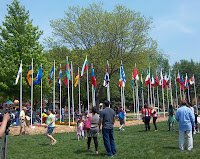It is a misnomer to call “How to End Poverty…” a play.
Rather, it was a series of skits, dance performances, monologs, power points,
audience participation, and facilitated discussions. The theatrical merit of it
can be debated. Personally, I found it too chaotic to be very effective, but be
that as it may, we had plenty to debate when we got home. If other people went
home and debated the issues, I guess it achieved its purpose.
Can poverty ever be ended? I highly doubt it. Although it should be possible, our country lacks the spirit of cooperation and compromise necessary to achieve it. The play posed the question how do we most effectively end poverty? Is it by addressing daily needs, changing the system, helping one individual rise out of poverty, improving our education system, or creating opportunities through micro-loans and other such efforts? In my opinion, the myriad causes of poverty are complex and need to be addressed by an all- of- the- above approach. That wasn’t one of the choices, however. That’s one reason that I never liked multiple choice tests which often beg simplistic answers.
At the end of the performance, the audience was divided into groups and instructed to choose one of the above methods to end poverty. The winning vote would decide which organization would receive a $1000 donation, partial proceeds from that night’s ticket sales. Whoever won would be a worthy cash-strapped organization. The method I chose lost. Since I am often in the vast minority, this wasn’t a shock to me. On our night, The Ark, which does much to address the needs of the Jewish poor in the Chicago area, received the $1000.
I hope that people who saw “How to End Poverty…” were
energized to do their part to end poverty or at least alleviate its worst effects. As we
speak, billionaires receiving farm subsidies are lobbying to cut appropriations
for the Food Stamp (now called SNAP) Program. Republicans in Congress are bent
and determined to repeal Obamacare which will provide healthcare to many who
have been uninsured many of them poor. Closer to home, in Chicago there’s an
appalling lack of low cost housing. Even so, there’s a movement in the City
Council to close one of the last SRO’s on the North Side. Those are places to
go for a systems approach. I’m sure that we can all think of several more. If
you prefer the daily needs approach, there’s also plenty to do.
Contact your nearest soup kitchen or food pantry and volunteer to give a few
hours per month. Since poverty most likely won’t end in the next 90 minutes,
you are in luck. You still have plenty of time.



